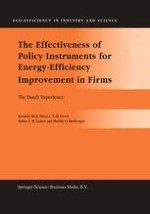2004 | OriginalPaper | Buchkapitel
Subsidising the Adoption of Energy-Efficient Technologies: An Empirical Analysis of the Free-Rider Effect
verfasst von : Kornelis Blok, Henri L. F. de Groot, Esther E. M. Luiten, Martijn G. Rietbergen
Erschienen in: The Effectiveness of Policy Instruments for Energy-Efficiency Improvement in Firms
Verlag: Springer Netherlands
Enthalten in: Professional Book Archive
Aktivieren Sie unsere intelligente Suche, um passende Fachinhalte oder Patente zu finden.
Wählen Sie Textabschnitte aus um mit Künstlicher Intelligenz passenden Patente zu finden. powered by
Markieren Sie Textabschnitte, um KI-gestützt weitere passende Inhalte zu finden. powered by
Subsidies are intensively used to steer the adoption of energy-efficient technologies. Their cost-effectiveness is disputed for a variety of reasons. First, in a competitive economy, subsidies increase aggregate emissions, which is essentially caused by the income transfer implied by the subsidy (and the associated entry of new firms or enlargement of existing firms). Subsidies — in other words — do not provide an incentive to reduce aggregate utilisation of energy. Taxes are in this context a more effective instrument in the sense that they result in declining aggregate emissions (for example, Baumol and Oates, 1988). Second, taxes generate revenues that can be used to reduce other distortionary taxes and to increase welfare (see the literature on the double dividend as discussed in, for example, de Mooij, 1999). Third, subsidies involve administration costs that tend to be larger than those for tax measures. These costs increase with the specificity of the subsidy program. Fourth, subsidies are often considered to be inefficient since they involve free riders. In this context, free riders are defined as agents who make use of the subsidy, but would have undertaken the subsidised action anyway — and without any delay (see, for example, Train, 1994). We will use this definition throughout this chapter. Because of these free riders, large public expenditures can be required per unit of effect, raising an issue of feasibility of granting subsidies in the presence of fiscal constraints (for example, Jaffe et al., 2000).
